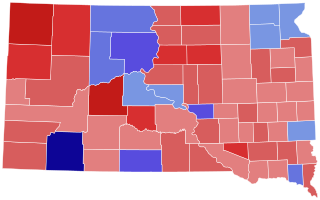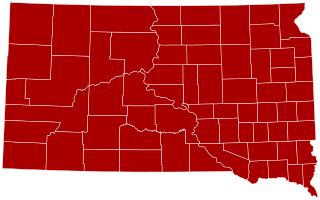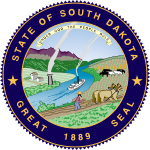
William John Janklow was an American lawyer and politician and member of the Republican Party who holds the record for the longest tenure as Governor of South Dakota: sixteen years in office. Janklow had the third-longest gubernatorial tenure in post-Constitutional U.S. history at 5,851 days.

Philip Edward Berger is a Republican member of the North Carolina General Assembly representing the state's thirtieth Senate district, which includes Caswell, Rockingham, Stokes, and Surry counties.

The attorney general of Minnesota is a constitutional officer in the executive branch of the U.S. state of Minnesota. Thirty individuals have held the office of Attorney General since statehood. The incumbent is Keith Ellison, a DFLer.

The attorney general of Oklahoma is the State Attorney General for the state of Oklahoma. The attorney general serves as the chief legal and law enforcement officer of the State of Oklahoma and head of the Office of the Oklahoma Attorney General. The attorney general is responsible for providing legal advice to the other departments and agencies of the executive branch, legislative branch and judicial branch of the state government. The attorney general is also responsible for the prosecution of offenses against Oklahoma law and advocate for the basic legal rights of Oklahoma residents.

The North Dakota attorney general is the chief legal officer of the North Dakota state government. The attorney general's office represents the state government in court cases and issues opinions of points of law upon request. Drew Wrigley was appointed to the position on February 8, 2022, to finish the term of Wayne Stenehjem, who died in office.

The Texas attorney general is the chief legal officer of the U.S. state of Texas. The current officeholder, Republican Ken Paxton, has served in the position since January 5, 2015.

The structure of the government of South Dakota is based on that of the federal government, with three branches of government: executive, legislative, and judicial. The structure of the state government is laid out in the Constitution of South Dakota, the highest law in the state. The constitution may be amended either by a majority vote of both houses of the legislature, or by voter initiative.

The 2010 Oklahoma elections were held on November 2, 2010. The primary election was held on July 27. The runoff primary election was held August 24.

Brendan Van Johnson is an American attorney who served as the 40th United States Attorney for the District of South Dakota. He is the son of former U.S. Senator Tim Johnson and currently is a partner at Robins Kaplan LLP, where he serves as the Chair of the Firm's National Business Litigation Group and Member of the Firm's Executive Board. In 2024, Johnson was recognized as one of America's Top 200 Lawyers for his litigation work and representation of Native American tribes.

Martin J. Jackley is an American attorney and politician who is currently serving as the Attorney General of South Dakota since 2023, having previously served from 2009 to 2019. He assumed office as Attorney General again in 2023 after winning the 2022 election unopposed. He previously served as the 39th United States Attorney for the District of South Dakota. He ran unsuccessfully for Governor of South Dakota in 2018, losing the Republican primary to Kristi Noem.

The 2018 South Dakota gubernatorial election took place on November 6, 2018, to elect the next governor of South Dakota. Incumbent Republican governor Dennis Daugaard was term-limited and could not seek a third consecutive term.

Randolph John Seiler was an American attorney and veteran serving as the chair of the Democratic Party of South Dakota from 2019-2023. He served as the 41st United States Attorney for the District of South Dakota from 2015 until his retirement in 2017. Seiler was previously the Deputy United States Attorney for the District of South Dakota.

The 2018 South Dakota elections were held on November 6, 2018. All of South Dakota's executive officers were up for election as well as South Dakota's at-large seat in the United States House of Representatives.

The 2018 South Dakota Attorney General election was held on November 6, 2018. Incumbent attorney general Marty Jackley was term-limited and ran for Governor of South Dakota. In June 2018, the South Dakota Republican party nominated Jason Ravnsborg for attorney general and the Democratic party nominated Randy Seiler. Ravnsborg won the election to become the 31st attorney general of South Dakota.

North Dakota held two statewide elections in 2020: a primary election on Tuesday, June 9, and a general election on Tuesday, November 3. In addition, each township elected officers on Tuesday, March 17, and each school district held their elections on a date of their choosing between April 1 and June 30.
Roger Alan Tellinghuisen is an American attorney, was the 27th Attorney General of South Dakota from 1987 to 1991.

The 2022 South Dakota gubernatorial election took place on November 8, 2022, electing the governor of South Dakota. Incumbent Republican governor Kristi Noem defeated Democratic nominee Jamie Smith to win a second term.

The 2022 United States attorney general elections were held on November 8, 2022, to elect the attorneys general in thirty states, two territories, and one federal district. The previous elections for this group of states took place in 2018. The attorney general of Vermont serves two-year terms and was last elected in 2020.

The 2022 South Dakota Attorney General election took place on November 8, 2022, to elect the next attorney general of South Dakota. On June 21, 2022, former Republican Attorney General Jason Ravnsborg was convicted and removed from office for malfeasance of office. The State Senate further barred Ravnsborg from holding office in South Dakota. Republican Mark Vargo was appointed to fill the remainder of Ravnsborg's term and did not run for a full term.
The Government of the U.S. State of Nebraska, established by the Nebraska Constitution, is a republican democracy modeled after the Federal Government of the United States. The state government has three branches: the executive, the legislative, and the judicial. Through a system of separation of powers, or "checks and balances," each of these branches has some authority to act on its own, and also some authority to regulate the other two branches, so that all three branches can limit and balance the others' authority. The State Government is based in Lincoln, the capital city of Nebraska.












































